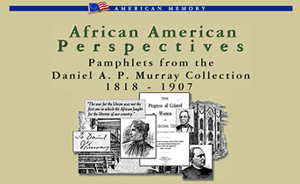talking history | syllabi | students | teachers | puzzle | about us
African American Perspectives: Pamphlets from the Daniel A. P. Murray Pamphlet Collection, 1818–1907
http://memory.loc.gov/ammem/aap/aaphome.html
Created and maintained by the Rare Book and Special Collections Division, Library of Congress, Washington, D.C., as a part of the Library of Congress American Memory project.
Reviewed April 6–13, 2005.
Pamphleteering is an enduring American pursuit. More than thirty-five years ago Bernard Bailyn pointed to the critical role played by pamphlet literature in advancing the cause of the American Revolution. The explosion of interest in the history of the book has given renewed impetus to the study of pamphlets in a variety of fields. Pamphlets played a critical role among African Americans in the nineteenth and early twentieth centuries. By their very nature, these documents can be readily distributed and inexpensively (and occasionally surreptitiously) passed along. Pamphlets are democracy in action. Precisely because they could be produced without the gatekeeping of the mainstream press, pamphlets became the medium of choice for fast distribution of an unmediated literature directly composed by and for (and often published within) the African American community.
The range and extent of black publishing, especially in the second half of the nineteenth century, are generally unrecognized. Such publishing became possible because of the “industrial” education offered at Hampton and Tuskegee institutes and elsewhere. Printing, one of the industrial arts, was taught at many black schools, including high schools such as Armstrong in Washington, D.C. But this particular art was a double-edged sword, for it required literacy and taught discipline, organization, and the power of the printed word. By the turn of the century, more than two hundred weekly newspapers were being published throughout the United States, and, when the papers were not being produced, presses were available to print other material, including pamphlets and broadsides. Pamphlets became the perfect medium for religious, fraternal, political, and social organizations to advocate for their own organizations and for the “uplift of the race.” They provided African Americans the opportunity for individual expression of literary creativity, religious reflection, and political opinion.
Daniel Alexander Payne Murray (1852–1925) assembled an important collection of African American pamphlets over a lifetime of personal collecting and during his service as staff member at the Library of Congress for over fifty years. Some 351 titles, many from his private collection, have been digitized as part of the Library of Congress National Digital Library Program and are located on the American Memory site. Though I could discover no comprehensive list of all pamphlets with full bibliographical citations, the collection includes many rare items, virtually all written by African American authors and a significant number of which were published by African American publishers. The texts are searchable by keyword (for example, the word Ethiopia and its extensions appear in thirty-three pamphlets); and the bibliographic records are searchable by the name of publisher or author. I could not, however, generate a single chronological list of the pamphlets; neither could I create a publisher’s list unless I already knew the name(s) of the publisher. If one has access to tif (tagged image file format) files, images (illustrations, title pages) may be displayed, but the full texts of pamphlets appear only in their transcript version, so that, regrettably, the entire pamphlet may not be viewed in its original state.
The pamphlets themselves cover a wide range of topics: literary, political, religious, artistic, educational, and historical. African American Perspectives is easy to use and will be valuable for secondary school teaching and the general public as well as for scholarly research. Introductory material clearly explains the history and scope of the collection. This is an important component of the American Memory project.
Randall K. Burkett
Emory University
Atlanta, Georgia

